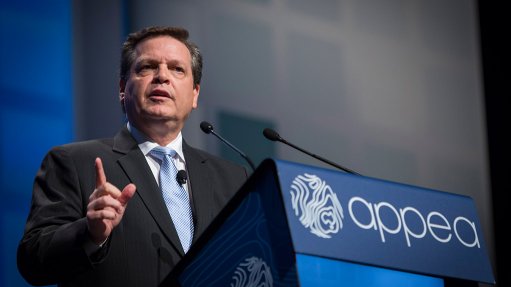
Chevron Australia MD Roy Krzywosinski
Photo by: Appea
PERTH (miningweekly.com) – Australia’s lack of competitiveness could hinder the second wave of investment into the liquefied natural gas (LNG) sector, Chevron Australia MD Roy Krzywosinski warned on Wednesday.
Speaking at the Australian Petroleum Production & Exploration Association (Appea) conference, in Melbourne, Krzywosinski noted that a major contributor to Australia’s falling international competitiveness was the cost of doing business in the country.
He cited research by the Business Council of Australia, which found that the cost of building a greenfield project in Australia soared to 40% above that of the US Gulf Coast.
“Irrespective of the current lower Australian dollar, we can no longer rely on strong commodity prices to bail us out. We need to remember, commodity prices are set globally, competitiveness is determined locally.”
Krzywosinski noted that while there was significant demand expected for LNG in the next 10 to 15 years, amounting to some 440-million tonnes a year which was nearly double today’s production, Australia had not seen a positive final investment decision on an Australian LNG project since 2012.
“As we look ahead, we need to claw back that competitiveness and create the investment environment here in Australia that helped us harness the gas boom in the first place. Not only to be in the race to attract future projects, but also to ensure the success of the operation and maintenance of the projects we are currently locked into.”
“We must prove that we can transition from construction to operations by providing operational predictability, reliability and competitiveness to meet our customer’s expectations.”
Krzywosinski said that the LNG industry had to continue to work hand-in-hand with the government to develop and implement policy that would ensure the country remained competitive in attracting future investment. The regulatory framework would have to encourage and not impede industry growth, he said, while a globally competitive taxation system would also need to be implemented.
Krzywosinski also called for a flexible and predictable industrial relations system that would encourage a more direct employee-employer relationship, and one which supported and embraced competitiveness.
“I believe we can reach common ground on the right policy settings, but it will require political leadership, as well as flexibility,” he said.
“It is a national imperative we get the policy settings right to attract the next wave of investment. Some would say this represents a potential A$100-billion waiting in the wings with the associated economic benefits.”
Krzywosinski said that developing a capable and responsive world-class services sector would also assist Australia in demonstrating it was investment-ready for the next wave of opportunity, and would position the country as a preferred global LNG supplier.
“If we get the policy settings right, apply a highly skilled service sector, and technology and innovation, the rest will follow,” he said.